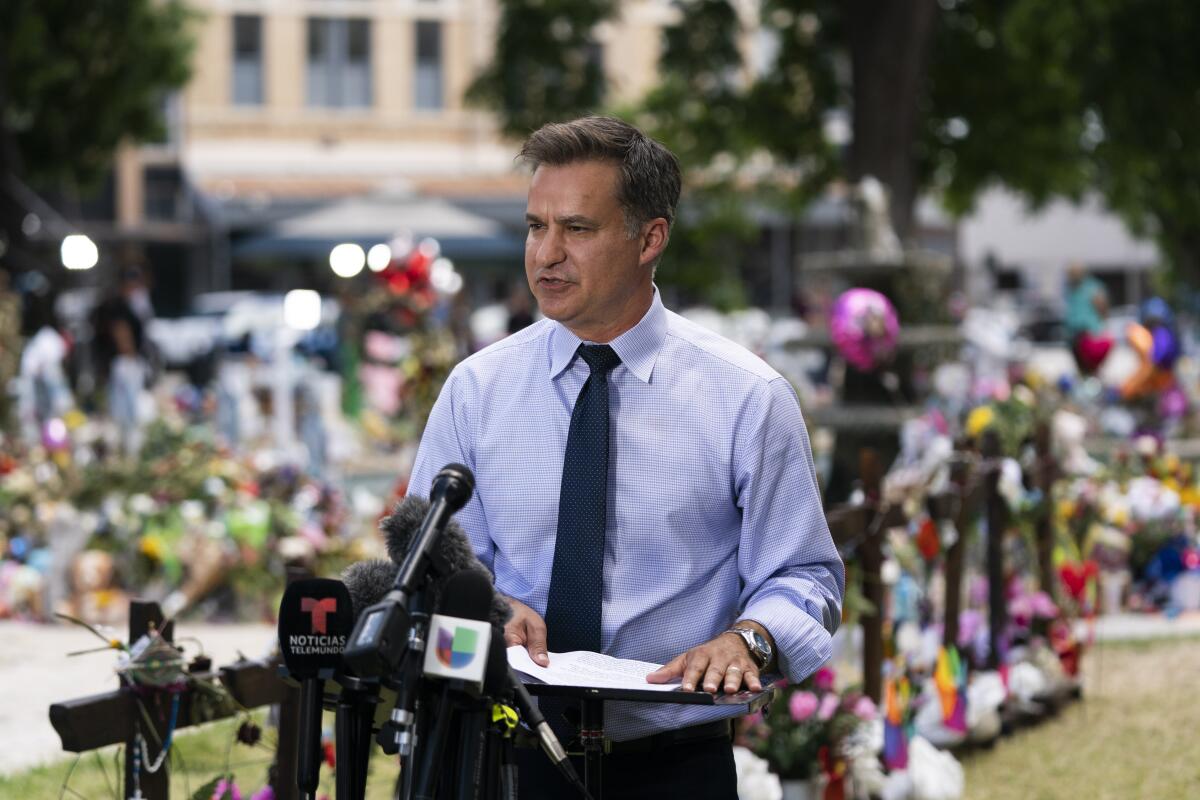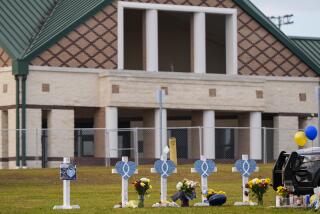Uvalde incident commander didn’t know of 911 calls, Texas senator says

- Share via
UVALDE, Texas — The commander at the scene of a shooting at an elementary school in Uvalde, Texas, was not informed of panicked 911 calls coming from students trapped inside the building as the massacre unfolded, a Texas state senator said Thursday.
Sen. Roland Gutierrez said the pleas for help from people inside Robb Elementary School on May 24 did not make their way to school district Police Chief Pete Arredondo. The Democratic senator called it a “system failure” that calls were going to the city police but were not communicated to Arredondo.
“I want to know specifically who was receiving the 911 calls,” Gutierrez said during a news conference, adding that no single person or entity was fully to blame for the massacre.
However, he said, Republican Gov. Greg Abbott should accept much of the responsibility for the failures in the police response.
“There was error at every level, including the legislative level. Greg Abbott has plenty of blame in all of this,” Gutierrez said.
Nineteen children and two teachers died in the attack at Robb Elementary School, the deadliest school shooting in nearly a decade. Seventeen other people were injured. Funerals for those who were slain began this week.
Abbott this week ordered the state to conduct in-person school district security audits and asked top lawmakers to convene a legislative committee to make recommendations on school and firearm safety, mental health and other issues.
The next Texas legislative session is scheduled for January. Gutierrez is among several lawmakers who have urged Abbott, who is running for reelection, to call a special session in response to the shooting.
The gunman, 18-year-old Salvador Ramos, spent roughly 80 minutes inside the school, and more than an hour passed from when the first officers followed him into the building and when he was killed by law enforcement.
Since the shooting, law enforcement and state officials have struggled to present an accurate timeline and details of the event and how police responded, sometimes providing conflicting information or withdrawing some statements hours later. State police have said some accounts were preliminary and may change as more witnesses are interviewed.
Much of the focus turned to Arredondo. Steven McCraw, the head of the Texas Department of Public Safety, said Arredondo believed the situation had turned into a hostage situation and made the “wrong decision” to not order officers to attempt to breach the classroom as 911 calls were being made to the outside.
Gutierrez said it’s unclear whether any details from the 911 calls were being shared with law enforcement officers from multiple agencies on the scene.
“Uvalde PD was the one receiving the 911 calls for 45 minutes while officers were sitting in a hallway, while 19 officers were sitting in a hallway for 45 minutes,” Gutierrez said. “We don’t know if it was being communicated to those people or not.”
But, the senator said, the Commission on State Emergency Communications told him the school district police chief did not know.
“He’s the incident commander. He did not receive [the] 911 calls,” Gutierrez said.
Arredondo has not responded to interview requests from the Associated Press since the attack. A telephone message left at the school police headquarters on Thursday was not immediately returned.
Uvalde Police Chief Daniel Rodriguez and a department spokesman have not responded to AP phone messages and emails seeking comment Thursday.
Police communications were also a problem in 2019 when a gunman shot and killed seven people and wounded more than two dozen during a shooting rampage in Odessa, Texas.
Authorities said at the time that 36-year-old Seth Aaron Ator called 911 before and after the shootings, but a failure in communication between agencies — they were not all operating on the same radio channel — slowed the response. Ator was able to cover some 10 miles before officers shot and killed him.
Reeves reported from Uvalde and Bleiberg reported from Dallas. Associated Press writer Jim Vertuno in Austin, Texas, contributed to this report.
More to Read
Sign up for Essential California
The most important California stories and recommendations in your inbox every morning.
You may occasionally receive promotional content from the Los Angeles Times.










